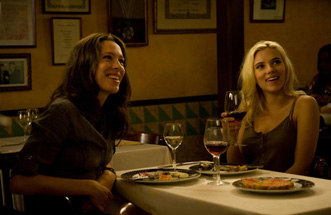Movie Review: Vicky Cristina Barcelona
By Matthew Huntley
September 4, 2008
BoxOfficeProphets.com

Setting his story outside of his much-adored New York City, Allen centers the drama on two 20-something Americans, Vicky (Rebecca Hall) and Cristina (Scarlett Johansson). A narrator (Christopher Evan Welch) tells us they'll be spending the summer in Barcelona. Vicky is researching the city for her masters degree in Catalan Identity while Cristina needed time away after breaking up with her latest boyfriend. She was also disappointed in a 12-minute movie she made about love.
Vicky and Cristina are best friends with very different views on love. Vicky is engaged to a conservative yet friendly businessman named Doug (Chris Messina). When we first meet her, she's traditional, judgmental and uptight. Her impulses are always at odds with her desire for safety, and it's the latter that always seems to win. Cristina is more open-minded, carefree and less discriminating. She's drawn to things and people that could be potentially dangerous.
In Barcelona, the two stay with Vicky's distant relatives, Mark and Judy (Kevin Dunn and Patricia Clarkson), who are not without problems of their own. Judy fears she's fallen out of love with Mark but feels it's too late to start over. She also keeps this a secret.
Vicky and Cristina eat, sight see and drink lots (and lots) of wine (if you have the chance to see the film in a 21 and over screening room, I say take it). One night, after visiting an art gallery, Vicky notices one of the artists gazing at them in a restaurant. This is Juan Antonio (Javier Bardem), a charming, virile Spaniard with a peculiar frankness and romanticism. He comes over to their table and asks if they'd join him on a weekend trip to Oviedo, where, he says, "We'll eat well, we'll drink wine, we'll make love...hopefully all three of us." Vicky, of course, is appalled and says no, but Cristina, addicted to spontaneity, accepts the offer. All three end up flying down in Juan Antonio's private airplane.
One of the things that makes Vicky Cristina Barcelona stand out is its natural-sounding dialogue and practical situations. All the characters speak complete sentences, with a rhythm that always keeps us intrigued in what they're saying. In a more conventional film, Vicky and Cristina would have been shocked by Juan Antonio's offer, or the film might have sacrificed the dialogue and become a routine thriller, but Allen has no interest in mocking Juan Antonio's proposal. He believes (and we believe) his offer is not too far-fetched or uncommon in Europe, where people tend to be less trepid towards strangers than in America.
The trip to Oviedo jump-starts two love triangles, one between Vicky, Cristina and Juan Antonio, the other between Cristina, Juan Antonio and Juan Antonio's ex-wife, Maria Elena ( Penélope Cruz), who once tried to stab him because "they're perfect for each other and not perfect for each other." Their relationship is one of extremes - happiness and hostility. It's interesting how, later on, Cristina becomes the missing variable to their blissful marriage. This story alone is one Francois Truffaut might have filmed.
I'll not go into the developments of each character or subplot because the film operates on a level of informality that keeps us wholly absorbed until the very end. It's a romantic comedy and serious drama that, for once, you cannot predict.
The film is also gorgeous to look at. It's striking and blown-out yet subtle and understated. Director of photography Javier Aguirresarobe gives Barcelona a dreamy, breezy look; it has the feeling of wind blowing and a bottle of wine within every reach. For a story with so much conflict and dramatic tension, it makes us feel surprisingly relaxed.
Allen, a born filmmaker, utilizes classic modes of film storytelling by letting the colors and images characterize the players - the contrast between Cristina's Goldielocks hair and Vicky's straight, brunette cut; Mark and Doug's matching Lacrosse Alligator polo shirts, both signifying conservatism and corporate America; Juan Antonio's five o'clock shadow and Maria Elena's unruly complexion. We also pick up on little hints and nuances, like when Cristina mentions to Juan Antonio the success of his sleeping with her depends on the kind of shorts he's wearing. Later on in the film, we see Doug wears plain white boxers, letting us know the differences between the two men.
The performances are carefully tuned and everyone involved knows exactly what they're doing, but they have a way of not letting it seem so obvious. Cruz has the juiciest role and may be recognized with a nomination or two early next year, but I think it's Bardem who deserves recognition because we see, after his Oscar-wining performance in No Country For Old Men, just how much of a character actor he is. Of course, we could only know this by comparing the two roles, but he's a remarkable talent.
This is one of Woody Allen's best recent films, shot and edited in a way so we're always fascinated by the story and where it's going. It's about characters who are always looking for change but are unwilling to change themselves. I will not reveal who ends up with whom, or who changes during the course of their Barcelona adventure, but what's great about the film is that none of this is relevant for our enjoyment. We marvel not in what happens, but wondering what will happen.